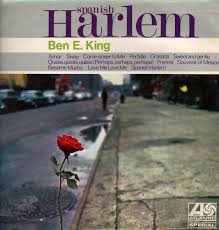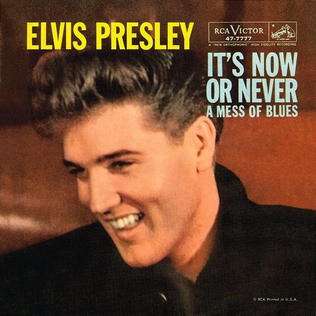
Terence Nelhams Wright, known as Adam Faith, was an English singer, actor, and financial journalist. As a British rock and roll teen idol, he scored consecutive No. 1 hits on the UK Singles Chart with "What Do You Want?" (1959) and "Poor Me" (1960). He became the first UK artist to lodge his initial seven hits in the top 5, and was ultimately one of the most charted acts of the 1960s. He was also one of the first UK acts to record original songs regularly.

Robert Thomas Velline, known professionally as Bobby Vee, was an American singer who was a teen idol in the early 1960s and also appeared in films. According to Billboard magazine, he had thirty-eight Hot 100 chart hits, ten of which reached the Top 20. He had six gold singles in his career.
"You Always Hurt the One You Love" is a pop standard with lyrics by Allan Roberts and music by Doris Fisher. First recorded by the Mills Brothers, whose recording reached the top of the Billboard charts in 1944, it was also a hit for Sammy Kaye in 1945.

"Spanish Harlem" is a song recorded by Ben E. King in 1960 for Atco Records. It was written by Jerry Leiber and Phil Spector and produced by Jerry Leiber and Mike Stoller. "Spanish Harlem" was King's first hit away from The Drifters, peaking at number 15 on Billboard's rhythm and blues and number 10 in pop music chart.
"Theme from A Summer Place" is a song with lyrics by Mack Discant and music by Max Steiner, written for the 1959 film A Summer Place, which starred Sandra Dee and Troy Donahue. It was recorded for the film as an instrumental theme by Steiner. Originally known as the "Molly and Johnny Theme", this lush extended cue, as orchestrated by Murray Cutter, is not the main title theme of the film, but an oft-heard secondary love theme for the characters played by Dee and Donahue. A subsequent recording by Hugo Winterhalter was the first to use the "Theme from A Summer Place" title. The theme has become a canonical representation of the easy listening genre, and is considered by some to be the definitive easy listening track of all time.
John Worsley, more widely known under the pseudonyms Les Vandyke and Johnny Worth, was an English popular music songwriter from the 1950s to the 1980s, who started his career as a singer.
"He'll Have to Go" is an American country and pop hit recorded on October 15, 1959, by Jim Reeves. The song, released in the fall of 1959, went on to become a hit in both genres early in 1960.

"Please Don't Tease" is a 1960 song recorded by Cliff Richard and the Shadows. Recorded in March and released as a single in June, the song became their third No. 1 on the UK Singles Chart spending three weeks at the summit. The song was written by the Shadows' rhythm guitarist Bruce Welch together with Pete Chester.

"It's Now or Never" is a song recorded by Elvis Presley and released as a single in 1960. The song is one of the best-selling singles by Presley, and one of the best-selling physical singles of all time. It was recorded by Bill Porter at RCA Studio B in Nashville. It is written in E major and has a tempo of 80 BPM.

"When the Girl in Your Arms Is the Girl in Your Heart" is a 1961 hit by Cliff Richard written by the songwriting team of Sid Tepper and Roy C. Bennett who would contribute fifteen songs to the Cliff Richard canon including his career record "The Young Ones". Produced by Richard's regular producer Norrie Paramor, "When the Girl in Your Arms..." featured backing by the Norrie Paramor Orchestra. Richard's own group the Shadows backed him on the B-side "Got a Funny Feeling".

The Shadows is an EP by The Shadows, released in January 1961. The EP is a 7-inch vinyl record and released in mono with the catalogue number Columbia SEG 8061 and in stereo with the catalogue number Columbia ESG 7834. The Shadows was the UK number-one EP for 20 weeks, having two separate stints at the top of the chart from January to June 1961. The cover photograph was taken by Angus McBean. The original picture showed Cliff together with the Shadows, however the layout for the EP was adapted and Cliff was replaced by yellow triangles.

Spotlight on The Shadows is an EP by The Shadows, released in February 1962. The EP is a 7-inch vinyl record and released in mono with the catalogue number Columbia SEG 8135. Spotlight on The Shadows was the UK number-one EP for 8 weeks, having two separate stints at the top of the chart from March to May 1962.

"Apache" is a song written by Jerry Lordan and first recorded by Bert Weedon. Lordan played the song on ukulele for the Shadows while on tour and, liking the song, the group released their own version which topped the UK Singles Chart for five weeks in mid-1960. The Shadows' guitarist Hank Marvin developed the song's distinctive echo and vibrato sound. After hearing the Shadows' version, Danish guitarist Jørgen Ingmann released a cover of the song in November 1960 which peaked at number 2 on the Billboard Hot 100 in the US.

"Early in the Morning" is a song by British band Vanity Fare, released as a single in June 1969. It became an international hit, peaking at number 8 on the UK Singles Chart and number 12 on the Billboard Hot 100 and was awarded a gold disc for sales over one million.
"Lessons in Love" is a song written by Sy Soloway and Shirley Wolfe and was first recorded by American teenage singer Jeri Lynne Fraser and released as a single in May 1961. The song has had chart success with covers by Cliff Richard and the Shadows and the Allisons.

Expresso Bongo is an EP by Cliff Richard and the Shadows, released in January 1960. It contains all the songs by the group sung in the film of the same name in which Richard also stars.

The albums discography of English singer Cliff Richard consists of 49 studio albums, seven soundtrack albums, 11 live albums, three cast recording albums, 17 mainstream compilation albums, one remix album, 12 box sets, eight gospel compilation albums and 47 EPs. It also includes numerous budget/mid-price compilation albums, repackaged albums, and foreign compilation albums.












